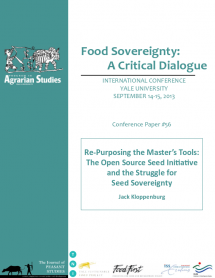Re-Purposing the Master’s Tools The Open Source Seed Initiative and the Struggle for Seed Sovereignty
Any reasonable vision of food sovereignty must necessarily encompass what might be called “seed sovereignty,” a condition which farmers have enjoyed for most of human history but ofwhich they have been recently dispossessed.

Authors
Any reasonable vision of food sovereignty must necessarily encompass what might be called “seed sovereignty,” a condition which farmers have enjoyed for most of human history but ofwhich they have been recently dispossessed. Corporate appropriation of plant genetic resources, development of transgenic crops, and the global imposition of intellectual property rights are now widely recognized as serious constraints on the free exchange of seeds and the development of new cultivars by farmers, public breeders, and small seed companies.
In response, legal and operational mechanisms drawn from the open source software movement have been proposed for deployment in plant breeding. Open source licenses mandate freedom of derivative use (“free as in speech”) but do not prohibit market sale (“not as in beer”). In the United States, an Open Source Seed Initiative (OSSI) has been organized by a working group of plant breeders, farmers, non-governmental organizations and sustainable food system advocates. OSSI promotes innovative plant breeding that produces resilient and productive cultivars adapted to a multiplicity of sustainable agroecosystems. It works to encourage and reward the sharing rather than the restriction of germplasm, to revitalize public plant breeding, and to integrate the skills and capacities of farmers with those of plant scientists.
A key tool for achieving these goals is development of open source licenses that preserve the right to use material for breeding and the right of farmers to save and replant seed. Implementation of open source arrangements could plausibly undergird the creation of a “protected commons” populated by farmers and plant breeders whose materials would be freely available and widely exchanged but would be protected from appropriation by those who would monopolize them.
However, the open source route to recovery of seed sovereignty looks different, and is differentially appealing, depending upon location in the geo-social landscape. While achievement of “seed sovereignty” is explicitly understood as a component of food sovereignty by many actors and organizations in the Global South (e.g., Via Campesina, Navdanya), OSSI’s approach has been criticized by some as one more expression of “positive” law which is regarded as inappropriate for life forms and ultimately destructive of customary arrangements. Opponents of GMOs, and indigenous groups, may find the stipulation of freedom of derivative use too liberal in its lack of prohibitions on genetic engineering.
Other Global South actors and organizations find considerable promise in an open source strategy, and welcome a proactive approach that would strengthen participatory plant breeding and provide a space for small scale and cooperative seed companies. OSSI is actively engaging these issues, while proceeding with implementation of open source licenses in the US. Negotiating these tensions is an inevitable and necessary part of the process of developing what we mean by, and how we enact, “food sovereignty.”
Jack Kloppenburg is Director, GreenHouse Residential Learning Community, Department of Community and Environmental Sociology, and affiliated with the Nelson Institute for Environmental Studies and the Agroecology Program, University of Wisconsin-Madison Jack Kloppenburg is founder of the REAP Food Group and most recently has joined with farmers, plant breeders and sustainability advocates to establish the Open Source Seed Initiative to apply open source mechanisms to plant breeding.
Food Sovereignty: a critical dialogue, 14 - 15 September, New Haven.